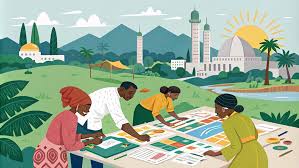11:09 AM Challenges and Realities: Navigating the NGO Landscape in Nigeria |

While the List of Charities and NGOs in Nigeria showcases organizations dedicated to improving lives across sectors, it's crucial to understand the operational challenges they face. Running a non-governmental organization (NGO) in Nigeria requires not just passion, but resilience, innovation, and adaptability in a complex environment. Funding Struggles and Financial SustainabilityOne of the greatest obstacles for NGOs in Nigeria is consistent and reliable funding. Many organizations listed on the List of Charities and NGOs in Nigeria depend on foreign donors or seasonal contributions, which can lead to budget volatility. Grant applications are competitive and often come with stringent conditions that smaller NGOs struggle to meet. To mitigate this, some groups are adopting social enterprise models—generating income through product sales or paid services while reinvesting profits into their charitable work. This approach not only creates financial resilience but also promotes self-reliance among beneficiaries. Regulatory and Bureaucratic BarriersOperating within Nigeria's regulatory framework can be a major hurdle. As seen with several entries in the List of Charities and NGOs in Nigeria, legal registration, tax compliance, and annual filings require administrative expertise and resources that small NGOs often lack. Furthermore, navigating government approval for foreign funding or partnerships can be slow and opaque, especially in volatile political climates. NGOs often must balance transparency with diplomacy to maintain relationships and funding pipelines. Community Trust and EngagementBuilding trust within the communities they serve is a gradual process for many organizations featured in the List of Charities and NGOs in Nigeria. Communities may be skeptical due to past failed interventions or because they’ve been approached by organizations with short-lived commitments. To address this, successful NGOs are prioritizing participatory methods—engaging locals in project design, implementation, and evaluation. This inclusive model fosters ownership and ensures solutions are tailored to real needs. Capacity and Human Resource GapsAnother common limitation is human capital. Many NGOs on the List of Charities and NGOs in Nigeria operate with small teams of volunteers or part-time staff. With limited access to professional development, training, and mentorship, these organizations can struggle to implement complex programs effectively. To bridge this gap, larger NGOs are partnering with academic institutions and international organizations for capacity-building workshops and exchange programs. Infrastructure and Technology LimitationsIn regions with poor infrastructure—especially in rural Nigeria—NGOs face challenges ranging from bad roads to unreliable power supply and lack of internet access. This affects everything from project monitoring to communication with stakeholders. Nonetheless, some innovative solutions have emerged. NGOs now use mobile reporting tools, solar-powered devices, and even offline data capture technologies to maintain operations under difficult circumstances. Organizations listed on the List of Charities and NGOs in Nigeria are at the forefront of this adaptation, demonstrating resourcefulness in the face of scarcity. ConclusionThe Nigerian nonprofit sector is a beacon of hope, but it is not without its trials. The organizations in the List of Charities and NGOs in Nigeria continue to overcome adversity with creativity and determination. Addressing these challenges systematically—through policy reform, local collaboration, and sustainable funding models—will be critical in amplifying their impact. |
|
|
| Total comments: 0 | |